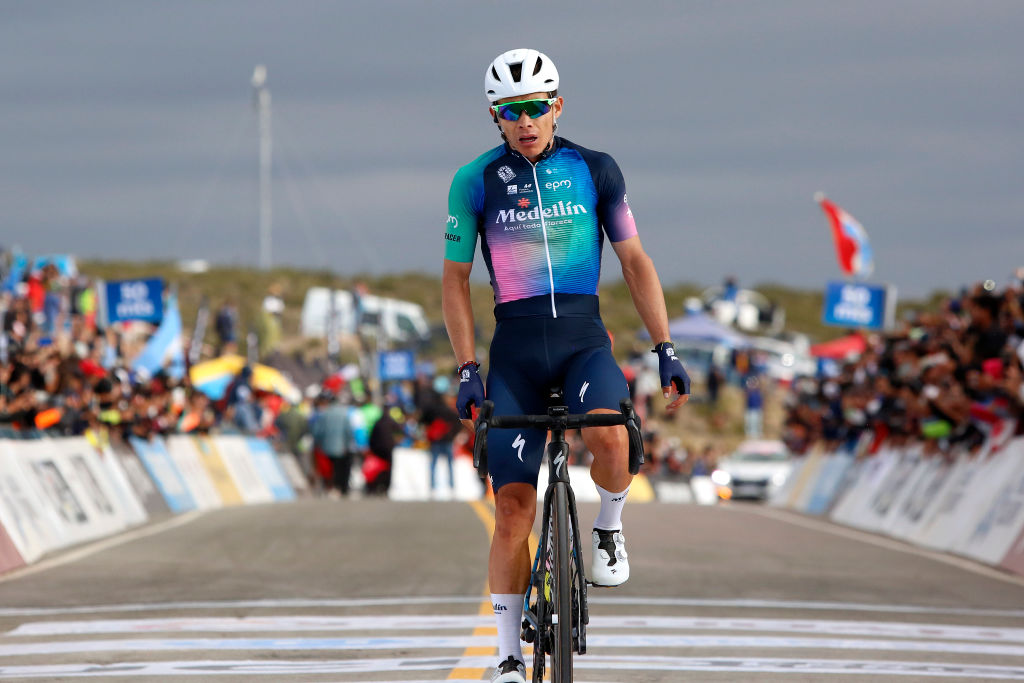
The UCI announced today they have notified Miguel Ángel López of a "potential anti-doping rule violation (ADRV)" and provisionally suspended him from racing.
The action comes after an investigation conducted by the International Testing Agency (ITA), the independent body that performs anti-doping controls and investigations for the UCI and other Olympic sports. The testing body obtained evidence from Operacion Ilex performed by the Spanish Guardia Civil and the Spanish Anti-Doping Organisation (CELAD).
The UCI press release specified that López's provisional suspension was for the potential ADRV for the "use and possession of a prohibited substance in the weeks prior to the Giro d’Italia 2022".
López was linked to Operacion Ilex for his connections to doctor Marcos Maynar who was at the centre of the Spanish investigation.
Maynar was arrested on May 11th, one day after López’s surprise withdrawal from the Giro d’Italia due to a leg injury. Maynar was charged with a crime against public health, drug trafficking and money laundering.
News about the arrest led Astana to suspend López on July 22, 2022, "until all the circumstances of the case are clarified".
López insisted he was innocent, saying through his attorney he denied, "having any relationship or participation in any criminal act related to the distribution of unauthorized medicines or any other product referred to in the news" at the time.
The team then reinstated López but, after seeing evidence that López had a “probable connection with Dr Marcos Maynar" they terminated Lopez's contract in December.
López was not suspended by the UCI at that point and signed with Medellin-EPM.
At the Vuelta a San Juan in January, which López won with his new team, he reiterated that he didn't dope and said his biological passport is clean.
He has filed a case with the Court of Arbitration for Sport against Astana for wrongful dismissal.
The doctor at the center of Operacion Ilex
Maynar, a professor on the Faculty of Sports Sciences at the University of Extremadura, has been linked to several doping investigations in the past. In 2004, he was under scrutiny for selling steroids online but escaped punishment by claiming they were for medical research.
In 2009, the Portuguese Cycling Federation suspended Maynar for 10 years on a number of charges, mostly relating to supplying banned substances when he was a team doctor for the Portuguese squad LA-MSS.
In January this year, Maynar vouched for López, but confirmed their connection, saying he'd only offered nutritional advice and nothing more.
"For other athletes, I wouldn't put my hand in the fire, but for this guy [López], I would put my hand in the fire that he has never used banned substances in his life."
However, his advice included recommending the use of Actovegin - a controversial substance made from calves' blood which is alleged to have been used for performance enhancement by riders in the early 2000s, including Lance Armstrong.
Actovegin is not prohibited by the World Anti-Doping Agency, but could fall under the UCI's no-needle policy that requires medical authorisation for injections, although it can also be administered orally.
Maynar said the tablets of Actovegin were "like a piece of black pudding in a pill", and has been used for people with heart disease "without any type of health problem" and "makes the cardiac muscle suffer less during efforts. It's not a substance that's on the doping lists, so it's not doping."
Also swept up in the investigation was Vicente Belda - a former racer and director for the Kelme team who was implicated in Operacion Puerto in 2006 - and his son, also Vicente Belda, who was a soigneur with Astana who was also dismissed from the team.
Much like in Operacion Puerto, where authorities found that Eufemiano Fuentes catered to professional athletes by providing training plans and doping schedules to go along with them for a fee, Operacion Ilex uncovered a similar ring, with six individuals under investigation.
The operation brought in clients from professional sports, "offering the services of a well-known sports doctor", according to the Guardia Civil statement. "These services included the preparation of training plans and nutrition programs as well as the consumption of medication and banned substances in sport."
This expert, not named but understood to be Maynar, and a PhD in Physiology would perform physiological testing at the University of Extremadura, and then be given training plans that reportedly included consuming banned substances, for a fee of up to €3,000 per season.
After an investigation of more than a year, three individuals who distributed substances supplied to athletes and clients were identified in Portugal, Guipuzcoa in the Basque Country and Castellon in eastern Valencia.
Maynar defended himself according to the EFE press agency. "All the leaks that have been made have been intended to hurt me, I assume it because I'm used to it, although then I have won the trials ... but it is unacceptable that other people are making life impossible, and it will be shown that they have nothing to do with it, that's not fair," Maynar said.
"We believe that everything that has been done is within the law and for the purposes of what the university has to be, which is to open our knowledge and activities to society, which is what we have tried, and that many people from Extremadura have benefited from everything we have done from the faculty," he stated.







